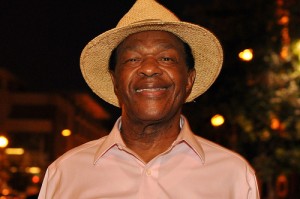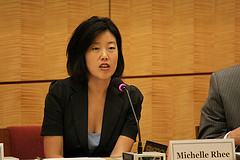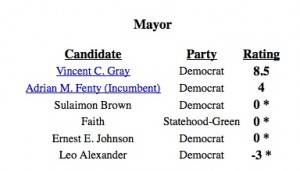So they poured money into the campaign of Fenty’s opponent, D.C. City Council Chairman Vincent Gray. The spin on the election was that Fenty lost touch with the city’s black voters, but behind the scenes it was another victory for special interests that care more about their job security than they do about America’s economic future. The side that seems dedicated to ensuring that the U.S. continues to fall behind other countries in academic performance — and thus in terms of competitiveness, growth and by extension, national security, scored a big victory … if anything so cynical and counter-productive could actually be called a victory…
Fenty
RECENT POSTS
Gray: “a cabinet that looks like” D.C.
Democratic Primary winner Vincent Gray was on WAMU 88.5′s Kojo Nnamdi Show today, taking questions and talking about the future. My favorite moment? When Kojo quoted a recent Colbert King column which contained this comedic gold; apparently Ward 8 political activist Philip Pannell once told WJLA that “that the makeup of Fenty’s cabinet, and his nominations to boards and commissions, “makes Tony Williams look like Shaka Zulu.”" After the laughter in the studio subsided, Kojo asked Gray “How will race factor in to the decisions you make in forming your cabinet, what is your sensitivity to the issue?”
Gray: “I want a cabinet that looks like the city. And that would be the template that I will try to use.”
See a video of the whole exchange (via The Kojo Nnamdi Show’s YouTube channel), below the fold.
Borderstan on Milloy and “myopic twits”
Remember that incendiary Milloy column? Borderstan gets it:
Yes, I guess Milloy was referring to this area of the city, to Logan Circle and U Street and the 14th Street corridor. We are, I suppose, the stereotype, of all things suspicious to Milloy. We have dog parks (two of them) and we have bike lanes (lots of them). “Chic eateries” and users of “social networks” abound…
On Tuesday, we collectively did as he suspects: Voters in precincts here gave Fenty 70 to 80% of the vote. But, while we supported him here, I don’t think you’d find many people here who would disagree that Fenty was the cause of many of his own problems….
None of this is meant to downplay the serious problems facing Washingtonians in other parts of the city, too many of them in dire economic circumstances. But wishing these newcomers would go away will do nothing to solve the horribly high rates of unemployment in DC.
I would also suggest—strongly—that many of my new neighbors make an effort to understand DC’s history. Only by doing so can you understand Milloy’s column and the frustrations he expressed.
Why is Barry more popular than Fenty?
One of the larger questions I want to explore on DCentric is, “Why is Marion Barry still so popular?” I know district residents who can rattle off a list of reasons why; I know other residents who are utterly perplexed by the man’s enduring appeal. There are often striking differences between those two groups (here’s one: the former are usually from here or have lived here for quite a long time).
I think it’s an important issue to understand, because the answer to that question involves race, class– and a different way of understanding the district. Don’t believe me? Well, just yesterday some DCers declared that Ward 8 voters’ support for Barry is proof that they aren’t that intelligent. Look at these comments from DCist, under Aaron Morrissey’s “Courtland Milloy vs. The World“:
Marion Barry and his cronies allowed the District to collapse in on itself during his time in office, which saw a skyrocketing crime rate, inept leadership in practically every city agency, and absolutely abysmal public schools. And as a consequence for his putrid leadership, he continues to get elected to the DC Council by the thoughtful residents of Ward 8. [link]
Fenty’s Poor Navigation Skills
The Atlantic’s Ta-Nehisi Coates on Adrian Fenty:
A lot has been made of the role of race in this campaign, and the sense that Fenty is the tool of white interlopers seeking to turn D.C. into Seattle. Fear of the oncoming white horde of gentrifiers is old in D.C. and I do not doubt that the paranoia was an integral part of the political landscape. But having understood that landscape, it’s a politician job to navigate it.
…The business is politics, not debate club.
It is not enough to simply be right, if only because sometimes you aren’t.
On your mind, right now: Michelle Rhee
DCPS Chancellor Michelle Rhee is such a polarizing figure that yesterday, some voters seemed to be voting either for or against her, rather than for Vince Gray or Adrian Fenty. After Fenty’s loss, Rhee has been on a lot of D.C. minds. Will she stay under Gray? Or will she move on?
I thought it would be interesting to take a look at what people were saying about her, on Twitter. Continue reading
Special Roundup: the Five Best Explanations for Adrian Fenty’s Loss
We usually serve links in the morning, but after yesterday’s historic primary, we’d be remiss if we didn’t round up the best post-mortems we’ve seen. Today, all anyone can talk about is, “What happened to Adrian Fenty?” The five features below have answers. The first article, from the Washington Post, is excellent– if you can only read one, that’s my pick.
How Adrian Fenty lost his reelection bid for D.C. mayor “…the story of a mayor who misread an electorate he was sure he knew better than anyone, who ignored advisers’ early warnings that key constituencies were abandoning him, who shut out confidantes who told him what he did not want to hear and who began to listen only when the race was all but lost.” (The Washington Post)
Adrian Fenty loses D.C. mayoral primary: Why his re-election bid failed “The price that Fenty was paying for all of those recreation centers, for all of the ribbon-cuttings, for all of the education initiatives, was the most powerful block of voters in town.No one could argue that he’d neglected black neighborhoods, but in the end, that was almost the point: Black neighborhoods, in many instances, didn’t want to see the brand of change Fenty was providing. Asked about the sparkling Deanwood Recreation Center, a Ward 7 resident quoted in the Washington Examiner said, “Fenty is getting ready for white people moving into the community.”" (tbd.com)
Post-Election Analysis: It’s Not The End of The District “Finally, reform just doesn’t turn back on itself, as Fenty tried to say it would. Over the last 12 years, each mayor has left a foundation upon which his successor has built. We can all marvel at what Fenty has done in four years, but not much of it would have been possible without Mayor Anthony Williams. Gray will enter office in uncertain economic times — but also with many of the toughest decisions already made for him. Reforms gain momentum and evolve — and even if he wanted to, Gray wouldn’t simply be able to stop the city and throw it into reverse. ” (DCist) Continue reading
“promptly broken” Promises
It’s finally election day in Washington, D.C. (and Maryland).
With all the attempts– and by this I mostly mean television ads– to frame Mayoral challenger Vincent Gray as regressive and old skool, I found it interesting that GLAA, The Gay and Lesbian Activists Alliance of Washington, D.C., gave Gray a score that was twice as high as Adrian Fenty’s on their primary ratings, a screen shot of which is to the right.
Fenty disagrees with GLAA on a number of issues, and his record is mixed. While his administration led the exceptional legal fight to keep and defend our marriage rights; they also spent nearly two years obstructing the Domestic Partnership Judicial Determination of Parentage Act, which is now a model law protecting the rights and responsibilities of LGBT parents. We were struck by the numerous promises made four years ago that were promptly broken.
The Root, on D.C. Politics
In a feature titled “The Chocolate City’s Two Faces”, The Root kicks off a three-part series examining D.C.’s local political scene:
…(Harry) Thomas said there are pockets of the city and residents who are not benefiting from its new status, with a population that is steadily increasing as urban centers become more attractive. “The issue becomes not just about race but about economics, salaries and opportunities,” he said…
Some members of Congress “ran this city like a plantation until Marion Barry came into office,” said Bernard Demczuk, assistant vice president of District of Columbia relations at George Washington University. “Blacks made up 70 percent of the city and did not have those jobs.”
Vince Gray’s Fans who were Formerly Fenty’s
Have you seen “Formerly Fenty“? It’s an offshoot of Vince Gray’s campaign site featuring voters who were once fans of our current Mayor. Most interesting/potentially damning? The videos from two ex-Fenty staffers, who describe their issues with their erstwhile boss. Here’s his quondam Deputy Chief of Staff, Neil Richardson:






